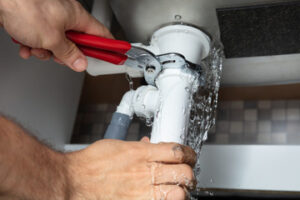Some plumbing repairs require the expertise of a plumber. These include issues like leaky toilets and a faulty float valve in a water tank. While some of these problems have at-home solutions, these are usually temporary and should be solved by a professional.
Other repairs are too complex to handle a homeowner, such as rerouting pipes or fixing a dishwasher. It is important to familiarize yourself with plumbing repair costs so you can budget accordingly. Click here at https://www.platinumplumbingsbc.com/ to hire an expert.

Cost
Plumbing plays an important role in how your home or business operates from day to day. Unanticipated repairs to the system can throw a wrench in your routine and put a dent in your wallet. The good news is that a licensed plumber has specialized equipment and a wide range of skills to address a variety of issues. In addition, plumbers are insured and bonded, meaning they can take on the responsibility for complying with all state and local plumbing codes.
In general, labor costs make up the majority of the cost of plumbing repair services. This includes the plumber’s hourly rate, plus any materials or parts that are needed to complete the job. The location of the plumbing problem also influences cost. For example, it is generally cheaper to fix a leak under a sink than it is to repair a pipe that is located inside a wall. The complexity of the plumbing issue can also increase the total cost. For example, rerouting pipes during a remodel will be more expensive than simply fixing a leaky faucet.
Other expenses that may be included in a plumbing repair bill include inspection fees, debris removal and disposal fees, and water damage restoration costs. These extra charges can add up quickly, especially if the plumbing repair is an emergency or occurs during rainy weather.
Another thing to keep in mind is that plumbing repair costs can vary significantly depending on the time of day or week that you need the plumber. If you have a sewage backup or burst pipe, for example, it is critical to act fast. Waiting even a few hours can lead to extensive water damage and mold.
One of the best ways to reduce the overall cost of plumbing repairs is to shop around for the best prices. Many plumbers offer competitive rates and discounts, so it is worth the effort to get several quotes. Additionally, some plumbers offer financing options. This can make it easier to afford the repairs that your home or business needs. However, it is important to understand the terms and conditions of the financing agreement before agreeing to it.
Repair Options
There are many plumbing repair options available, but they all depend on the specific issue. For example, if you have low water pressure, your plumber may need to inspect the pipes for issues like leaks or blockages. The plumber might recommend installing a water pressure-boosting system to address the problem.
Other common plumbing repairs include fixing mechanical malfunctions and clearing clogs. Mechanical malfunctions are generally related to faucets and valves, while clogs occur in the drainage system. Some mechanical problems can be easily fixed by tightening loose fixtures or adjusting pipe connections. However, if the underlying cause is a serious issue, then your plumber will need to implement more extensive repair solutions.
Professional plumbers have the tools and equipment to get the job done right the first time. They are also trained to spot potential problems and offer preventative maintenance advice. Professionals can also ensure that the plumbing work is up to code. In addition, they can help homeowners avoid costly insurance claims by doing things such as locating and fixing hidden water leaks.
It is possible to do some basic plumbing repairs yourself, but it is important to know what you are doing and have the right supplies. Make sure to shut off the main water supply before starting any projects, and wear protective clothing and old clothes in case you get wet. Always follow the manufacturer’s instructions when using appliances such as water heaters and toilets, and never attempt any DIY repair jobs that could lead to dangerous conditions.
The cost of a plumbing repair will vary depending on the severity of the issue, but there are ways to keep costs down. The biggest thing is to take care of small problems before they become bigger ones. Fixing a leaky faucet or toilet as soon as you notice it will save both money and water. It is also a good idea to invest in energy-efficient appliances, such as showerheads and toilets, which will save you money on your utility bills.
Another way to save money is by choosing the most durable pipes for your home. For instance, PVC pipes are a good choice for drain lines and vent stacks because they are resistant to corrosion and can last for decades without needing replacement. If you’re thinking about replacing your pipes, consider getting PVC instead of copper, which is more expensive and can corrode over time.
Preventive Measures
Plumbing repairs can be expensive, but you can take preventive measures to keep them from happening in the first place. The best way to reduce the risk of costly plumbing emergencies is to perform regular maintenance on all parts of your water system, including sinks, toilets, drains, and your water heater. Here are a few ways you can do this:
Look for leaks. Leaky faucets and showerheads can add up to high water bills and cause damage if left unattended. Check for water stains underneath your sinks and around the fixtures to catch any problems early.
Install drain strainers in all of your sinks to keep hair, soap scum, and other debris from clogging the drains. Use vinegar and baking soda to regularly clean out your drains to keep them flowing smoothly. Make sure to regularly inspect your septic tank and sewer lines for any signs of cracks or breaks, which are often easy to spot with a visual inspection.
Check your hoses and outdoor faucets for any kinks or leaks, which are easy to fix before they become major problems. Drain your water heater annually or semi-annually to remove sediment and rust, which can affect its efficiency. Consider using a water softener to reduce the amount of minerals that deposit in your pipes and cause clogs.
Consider replacing any exposed plumbing pipes that are old and corroded to prevent them from leaking or breaking. Typically, these will need to be replaced with newer, more durable pipes made of copper or PEX plastic.
Create a plumbing maintenance schedule to help ensure that you don’t miss any important steps. A good schedule will also encourage you to stay on top of routine maintenance, rather than waiting for an emergency repair before you act.
Generally, homeowners insurance covers any ensuing water damage from a sudden leak, but you should always review your policy to get a better idea of what’s covered and what isn’t. Most homeowner’s policies won’t cover a leaking pipe that is the result of wear and tear over time. Regularly checking your home for potential issues and making minor plumbing repairs immediately as needed can save you thousands of dollars in damages and avoid major plumbing disasters.
Do-It-Yourself Options
With the advent of the Internet and DIY videos, many people think they can take on home improvement projects without a professional. This may be true for some painting projects and pouring a new patch of concrete, but it’s a whole different ballgame when it comes to plumbing repairs. Even the simplest of DIY plumbing fixes can lead to significant damage if done incorrectly, and the wrong tools are used or procedures are skipped altogether.
Plumbing is more than just fixing leaky faucets — it involves working on pipes under your house, walls, and ceilings that can affect the integrity of your entire structure. A plumber has years of training and experience to perform these types of jobs, and they can use that expertise to ensure the job is done right the first time.
A good plumber can spot potential problems and stop them from escalating into costly emergencies. For example, they can look for mineral deposits on drains and pipe fittings to know if it’s time to clean them. Moreover, they can use the correct pipe sizes and materials for your house’s specific plumbing needs. This is important because using the wrong size or type of pipe can cause leaks and even water damage to your home’s interior.
Most homeowners’ insurance policies do not cover damage caused by DIY projects, so if your attempts at plumbing repairs turn into a disaster, you could end up paying for the damage out of pocket. Furthermore, plumbing supplies and equipment are often expensive, and they may not be something that the average person has lying around their garage. A real plumber, on the other hand, has access to these tools and will already have them on hand for any future plumbing work you might need.
Despite all the pros of having a professional plumber do your plumbing repairs, some people still prefer to attempt them themselves. This is especially true if they are looking to save money on their repair bill. However, it is also important to keep in mind that you should never try to fix a problem that you don’t have the experience and skills to do properly.

